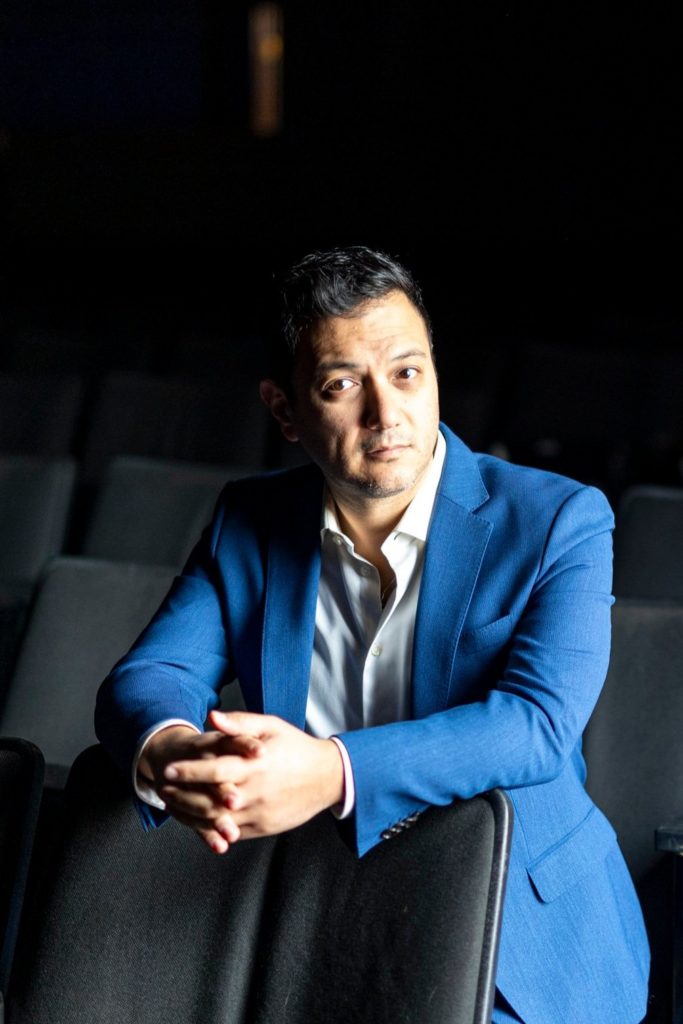Phan, Copland House offer American music from the outside
The Music From Copland House chamber concert series is back this season in Elebash Hall in the CUNY Graduate Center. Along with the usual intriguing look into the corners of American music, there is an attractive added feature: all concerts are free.
Monday night, the program mixed instrumental and vocal music with tenor Nicholas Phan around the title, “These Strangers.” The pieces, including the instrumental ones, looked at different ideas of being a stranger in America: as an immigrant or traveler, as a minority, as a social outsider of one kind or another. Even with a specific theme, the concert was full of variety. While largely contemporary, there were two pieces from between the World Wars, when this thinking in American composition had its first major blossoming.
Ke-Chia Chen’s Song of the Wanderer was the opener, played by clarinetist Derek Bermel and pianist Michael Boriskin. In a concert that was mostly songs, this was also close to song, with a mournful folk-like theme that Berman played with a rich, low register sound. Then the music became more song-like in a jazz sense, with a series of passages that sounded close to improvisation based on fragments of the theme, with Boriskin following each twist and turn. The music was full of surprises, and a brief recapitulation affirmed the songful quality of the piece.
There were two sets of songs from Lembit Beecher and Jake Heggie, respectively, Beecher’s Three Immigrant Songs and Heggie’s These Strangers. The latter was just for tenor and piano, the former added cello (Alexis Pia Gerlach) and French horn (David Byrd-Marrow).
Beecher set poems about the immigrant experience, translated from Greek, Chinese, and in mixed Lithuanian and English. These were skillfully done, with strong, yearning singing from Phan. Even with the added instruments, Beecher’s orchestration was spare, using grainy, astringent timbres to create a feeling of solitude. Phan channeled this quality, sounding like a man working through private experiences.
Heggie’s style was more of straightforward, public statements, especially working with the likes of Emily Dickinson, Frederick Douglas, and Walt Whitman. These settings were public pronouncements, and Phan was elegant and flowing in Heggie’s graceful melodies. Things fell apart with the third setting of Martin Niemöller’s famous, wrenching poem “I Did Not Speak Out.” One understood the logic of keeping the music calm until the great tragedy arrives, but the style was saccharine—perhaps a misguided attempt at producing irony in a poem that is magnificently beyond that. Phan recovered the performance with his singing of the finale, a setting of Whitman’s “To A Stranger.”
The single finest moment of song came with Missy Mazzoli’s expert setting of text from the journals of Isabelle Eberhardt, The World Within Me Is Too Small. The vocal lines were succinct and had a subtle drive, and Mazzoli’s harmonies are always strong. Phan sang like one who gathered strength from their solitude.
Ruth Crawford Seeger’s “Chinaman, Laundryman” was a fascinating curiosity. The piece is nowhere near her best work or even a workable song, with more recitation than singing, and a text, decrying anti-Asian bigotry. Seeger’s propulsive, repetitive writing for the piano sounded like the first step in a process that led to Fred Rzewski’s great masterpiece, Coming Together.
That came from 1932, as did Florence Price’s traditional and expert setting of Paul Lawrence Dunbar’s “Sympathy,” with the famous first line, “I know what the caged bird feels, alas!” Phan hit all the marks, with excellent articulation and a sense of pleasure in these well-crafted lines.
Pierre Talbert’s quintet, Crossings, came last. Scored for violin (Siwoo Kim), cello, flute (Beomjae Kim), clarinet, and piano, this single-movement work in three sections was tightly built and wrapped around a French Canadian folk song. That lovely, minor-key melody came out in the slow middle section, and around it the music had real drive and weight, and the coda satisfied the formal satisfactions of the whole work. The playing was energetic and Siwoo Kim’s idiomatic phrasing was delightful and added forceful expression to the performance.
Music from Copland House presents music from Kenji Bunch and Gabriela Lena Frank, 7:30 p.m., Monday, February 6, 2023. coplandhouse.org
